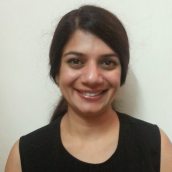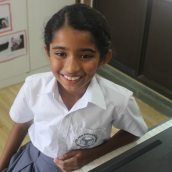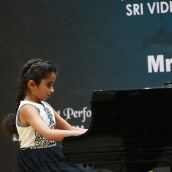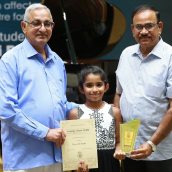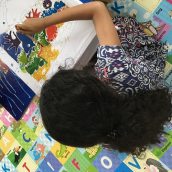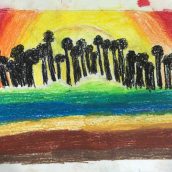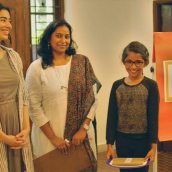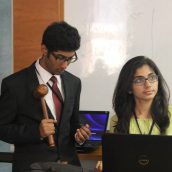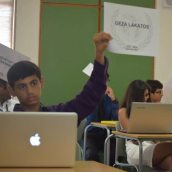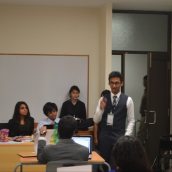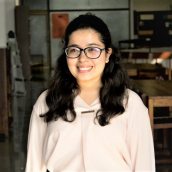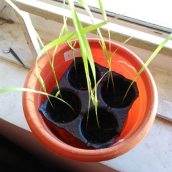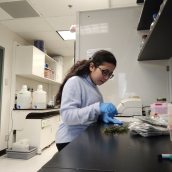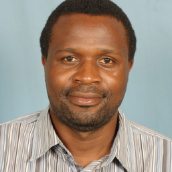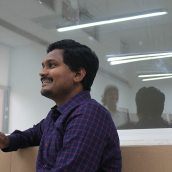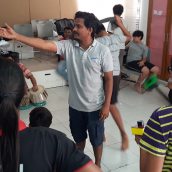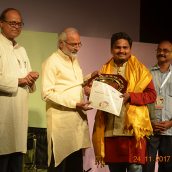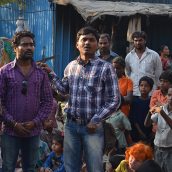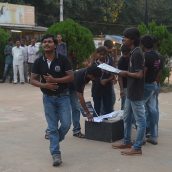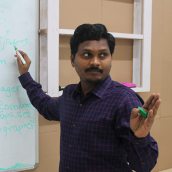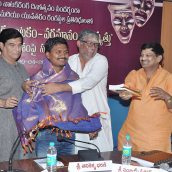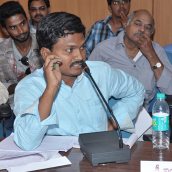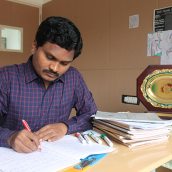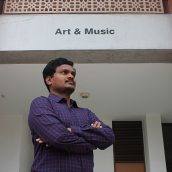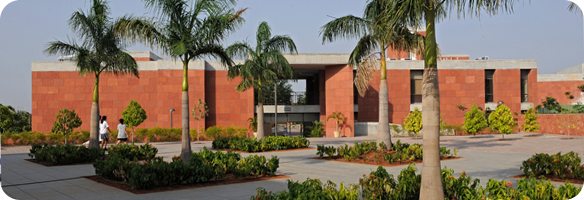
Our Campus
Built on a 100-acre site near the Rajiv Gandhi International Airport, the Aga Khan Academy Hyderabad offers state-of-the art facilities on a secure, landscaped campus.
Our school is the second in a network of about 18 planned Academies offering the highest international standard of education to students in countries across Africa, South and Central Asia, and the Middle East.
The campus has been specially designed by renowned architects and is purpose built. Our facilities include the following academic and resource areas:
- subject and age-specific classrooms
- well-equipped science and computer laboratories
- library and resource centres
- rooms for the fine arts, music and dance, including individual practice booths and a music recording area.
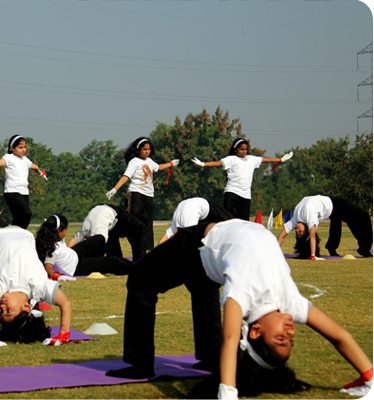 The Commons building houses the dining hall and an array of spaces for school activities. It is designed to be the hub of student activity, serving as the Academy’s main space for major school functions, including music and drama performances, and public lectures.
The Commons building houses the dining hall and an array of spaces for school activities. It is designed to be the hub of student activity, serving as the Academy’s main space for major school functions, including music and drama performances, and public lectures.
Sports facilities
Our sports facilities are extensive and include:
- swimming and diving pools
- sports fields, for example for soccer, hockey and athletics
- cricket pitch
- tennis and squash courts
- athletics centre for aerobics, dance and fitness.
We invite you to visit the Academy to take a tour of our campus.
Vasanthi Thandlam: Lifelong learning and giving
An active volunteer for Operation Smile, an international charity group that helps children with cleft palates around the world, Vasanthi trained at the Operation Smile head office in Norfolk, Virginia, USA and has been passionately promoting the cause for five years. She started an Operation Smile club at the American International School Chennai with a small group of high school students who went on to participate in various local and international medical missions.
Now, Vasanthi will be accompanying a team of Indian students to Vietnam to make presentations on various health modules. These not only teach prevention and basic health knowledge but also help reshape everyday habits of people with unhealthy lifestyles. Health education is an effective tool to improve health in developing nations. In the future, she hopes to bring Operation Smile to the Aga Khan Academy Hyderabad.
Tanish Panjwani (Class of 2019) - advocating scientific solutions for a better world
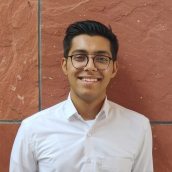 Tanish Panjwani is an alumnus of the Aga Khan Academy Hyderabad's Class of 2019 and is determined to follow a path he will carve independently, “off the beaten track.” He attributes this fierce individuality to the opportunities he has been presented with in school.
Tanish Panjwani is an alumnus of the Aga Khan Academy Hyderabad's Class of 2019 and is determined to follow a path he will carve independently, “off the beaten track.” He attributes this fierce individuality to the opportunities he has been presented with in school.
"The Academy has pushed me to boundaries and spaces which I never imagined being in,” he expressed. “It has taught me many important life lessons which I wish to take with me as I move towards university. One of these is to always try something new. It gave me so many opportunities to explore my passions for which I am eternally thankful."
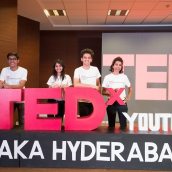 Tanish was one of the three student organisers of Academy in Hyderabad’s pioneering TEDx conference, which took place in May 2018.
Tanish was one of the three student organisers of Academy in Hyderabad’s pioneering TEDx conference, which took place in May 2018.
“TEDxYouth@AKAHyderabad began as a revolution of ideas that inspired me to dream big and accomplish more. I wanted the students in the Academy to dream and imagine with the same ferocity, and come up with ideas that not only solve global problems but also inspire. This was my motivation behind organising such a conference here.”
Additionally, he held key leadership positions in the Academy’s Model UN conferences, played in the Senior School football team and was a chief editor of the student newsletter.
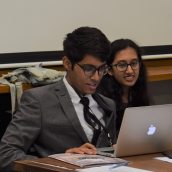 However Tanish’s passion lies in the realm of physics, believing in the power of scientific solutions to address current global issues.
However Tanish’s passion lies in the realm of physics, believing in the power of scientific solutions to address current global issues.
“A better understanding of our surroundings helps us gain a better understanding of ourselves," he said. "The biggest breakthroughs have come from principles based on physics – smartphones and normal appliances are built on the foundations of quantum tunneling. Not understanding physics hinders us from truly understanding the world around us.”
For his Grade 10 personal project, Tanish focused on the importance of a future free of climate change and pollution. He used an old television to make a cathode ray tube (CRT) that disintegrated plastic and created something new in its place. He draws inspiration from his physics teacher Sudipta Roy.
“He teaches with such great passion and his zestful energy lights up my mood inspiring me to study even the most boring (and difficult) topics.”
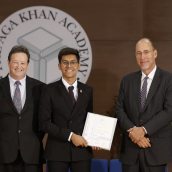 Tanish was accepted into University College London and the University of Glasgow to study pure physics, and intends to make connections in the fields that interest him. He wants to get involved in actively educating people about the possibilities of approaching everyday problems through the lens of science, by utilising concepts learnt within classrooms to bring small changes in their immediate environments, leading to big changes in a bigger context.
Tanish was accepted into University College London and the University of Glasgow to study pure physics, and intends to make connections in the fields that interest him. He wants to get involved in actively educating people about the possibilities of approaching everyday problems through the lens of science, by utilising concepts learnt within classrooms to bring small changes in their immediate environments, leading to big changes in a bigger context.
Contributed by Saheb Lakhani (Class of 2014).
Aanya Athota - Junior School's budding concert pianist
Rising Beyond: Inspiring Debate at the MUN
The simulation opened with an aesthetic dance performance showcasing culture that exists in great depth, as well as having Birad Yajnik speaking about global citizenship and leadership. The opening ceremony was followed by the first session of this simulation which consisted of students prepared for heavy debate.
The first session was preliminary and introduced the agendas and topics of debate of each committee to all the delegates. DISEC (Disarmament and International Security Committee) was engaged in debating over the international intervention in Civil Wars; ECOSOC (Economic and Social Council) debated over the impact of science, innovation and technology in achieving the millennium development goals; the JCC (Joint Crisis Committee) went back into history and debated over issues concerning World War II; and lastly, we had the Press Corps which interacted with each committee and their delegates of the conference, and got intensely rooted in the simulation, in order to provide for a very holistic experience of the whole event that took place.The second day still carried on with the same passion and enthusiasm. The second session started off with a morning crisis update, which proved to be quite a surprise to all the delegates. However, the debates in each committee over the crisis initiated slowly, and later escalated into deeper and effective discussions. The Press were involved in initiating Crisis in each committee which proved to be operative as it provoked heavy debates and discussions, further on the day. The second day proved to be an ecstatic and progressive one as it stimulated every mind, which resulted in exciting preparations for resolutions for the last day. The Delegate Dance was of course one of the highlights of the second day of the simulation.
Eventually came the final day of the simulation. The day proved to be brief but tense as delegates of each committee had to come up with effective resolutions according to their agendas. Every committee except for JCC (as it was historical) and DISEC succeeded in coming up with resolutions. Although DISEC failed to pass a resolution, it still instilled the sense of intrigue, passion and enthusiasm to overcome problems that are faced on the surface of the planet – each day and every moment.After having come up with a variety of resolutions, the time for closing the simulation had come. This time was much awaited by the delegates as it was also an award ceremony. Titles such as “Best Delegate”, “Outstanding Delegate”, “Best Photographer” and “Best Reporter” echoed the halls of the venue wherein the ceremony took place. After having a hearing of speeches of inspiration and accomplishment by the Security General and the Executive Board, as well as teachers and staff who functioned as a backbone to the simulation; and watching proud delegates walking towards their much deserving awards, came the time of saying a proud goodbye to the Aga Khan Academy, Hyderabad’s second edition of the Model United Nations conference. Now awaits the third edition which shall happen in Fall, 2015.
By Akanksha Dev
Sarah Keshvani (Class of 2018): using biology to tackle environmental challenges
Sarah’s love for the sciences flourished during the Diploma Programme (DP) at the Academy in Hyderabad. Through her extended essay, she found the opportunity to learn more about how biology can provide solutions to modern challenges faced in local communities. She decided to tackle the issue of water shortages and soil nutrient deficiencies hindering large scale rice cultivation in the state of Telangana, leading to reduced crop yields. Due to zinc deficiencies in the soil, farmers resort to using huge amounts of fertilisers, which further degrade soil quality.
Sarah’s research centred on hydroponics as a possible solution to this problem. Plants are grown in water-based, nutrient solutions instead of soil.
“This technique has recently garnered a lot of attention because experiments have shown that growth is more than doubled when compared to traditional methods of agriculture,” Sarah explained. “Nutrient uptake is more efficient, and farmers can control the type of nutrients the plant is exposed to, in order to enhance different features of the yield. The use of water in hydroponics is still much more efficient than how it is used in open paddy fields that need to be covered in water during certain times of the crop cycle.”
Sarah’s conclusions were positive. Rapid growth was observed and the flexibility to control the nutrient uptake played a huge role in optimal plant health. She realised that a closed system would have provided more accurate results, as the higher evaporation rates disturbed the pH levels. Overall though, she deduced this technique could definitely tackle the challenges faced by paddy farmers.
“The IB curriculum followed at the Academy has played a pivotal role in building many essential skills for university life,” Sarah reflected when asked how she has settled into this new phase. “The emphasis on academic integrity and independence have served me really well here. I was taught to think critically rather than blindly follow textbooks. Its skill-based learning approach, and connecting classroom learning to the real world, also prepared me well for higher education.”
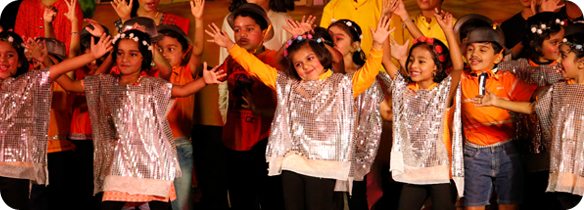
Primary Years Programme
The Junior School of the Aga Khan Academy Hyderabad is an International Baccalaureate World School and has been authorised for the Primary Years Programme (PYP).
Foundations for lifelong learning
We offer the PYP for students in grades 1–5 (aged 6–10). The programme focuses on the development of the whole child. It is geared towards creating independent, confident and respectful learners.
Our classroom curriculum addresses the children's social, physical, cultural and ethical development while giving them a strong foundation in all the major areas of knowledge.
The curriculum consists of five essential elements:
- concepts
- knowledge
- skills
- attitude
- action.
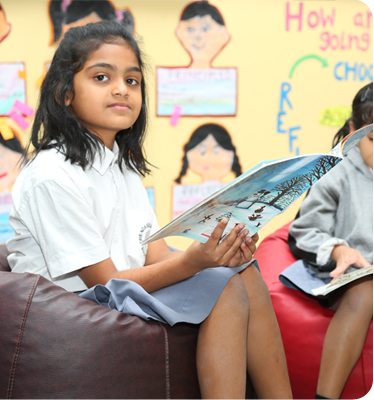 The core subjects we cover include English language, mathematics, social studies, science and technology. Our programme also includes a beginning computing course, physical education, music, art and Hindi.
The core subjects we cover include English language, mathematics, social studies, science and technology. Our programme also includes a beginning computing course, physical education, music, art and Hindi.
Students and teachers explore questions in all subject areas using an interactive, student-centred approach. The knowledge element of the curriculum is enhanced by six themes that are studied across the various subject disciplines. These are:
- who we are
- where we are in place and time
- how we express ourselves
- how the world works
- how we organise ourselves
- sharing the planet.
These transdisciplinary themes of global significance are addressed through six units of inquiry at each grade level, and this forms the school’s programme of inquiry. The programme of inquiry is the conceptual curriculum framework for the PYP. The transdisciplinary themes ensure that they are "revisited throughout the students’ years of PYP so that they are immersed in broad ranging, in-depth, articulated curriculum content” (Making the PYP Happen: A curriculum framework for international primary education).
The PYP develops well-rounded students who are well versed in all areas of knowledge. They learn to be intellectually curious, principled, caring, open-minded, well balanced and reflective learners.
Please visit the Admission Requirements page or contact us to find out more about applying to the PYP at the Academy.
Zviko Katsande: Zimbabwean educator embodies global-mindedness
Chandrasekhar Indla - Holding the baton of Telugu theatre
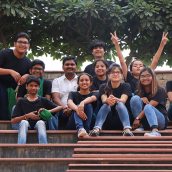 All the world's a stage, Shakespeare famously wrote, and all the men and women merely players. Chandrasekhar Indla, drama faculty at the Academy’s theatre arts department, would take a dim view of such a simplistic description of a stage play. As director, lighting designer, sound technician, mask-maker and writer, Chandra has been a part of hundreds of performances and, talking to him, you would believe that the stage is possibly more than the world, and players perhaps more than merely men and women. “Drama is an important instrument that can build a sense of consciousness in society,” he shares. “There is a need to save and reinvent drama.” For over five years now, he has dedicated his career to introducing children to the world of theatre arts.
All the world's a stage, Shakespeare famously wrote, and all the men and women merely players. Chandrasekhar Indla, drama faculty at the Academy’s theatre arts department, would take a dim view of such a simplistic description of a stage play. As director, lighting designer, sound technician, mask-maker and writer, Chandra has been a part of hundreds of performances and, talking to him, you would believe that the stage is possibly more than the world, and players perhaps more than merely men and women. “Drama is an important instrument that can build a sense of consciousness in society,” he shares. “There is a need to save and reinvent drama.” For over five years now, he has dedicated his career to introducing children to the world of theatre arts.
A prolific academic, Chandra was among highest scorers in the National Eligibility Test, an exam held nationwide by the University Grants Commission (UGC) which qualifies people to teach performing arts at a collegiate level. His work since his first tenure as a master’s student at the University of Hyderabad has been about introducing drama to a young audience. He was among the first members of the university’s Theatre Outreach Unit, created to expose children all over the state to theatre arts. He joined the Aga Khan Academy Hyderabad in 2015 to continue in this effort. “Our Academy is one of the best places where the teacher-student relationship is so strong in terms of respecting each other and sharing thoughts,” he says. Chandra, not a technical direcor for drama at the Academy, was very happy to teach at the Academy because the IB curriculum gives theatre arts the importance of a elective, rather than just tacking it on as a co-curricular activity as other school programmes do.
With two master’s degrees and a PhD on the way, Chandra surprisingly admits he wasn’t very good at school. In fact, he even struggled through his first degree, a bachelor’s in computer science. “I don’t remember any programming today,” he confides. Once Chandra relieved himself of his pursuits in technology and began honing in on theatre, his academic performance drastically improved. He finished his master’s in performing arts with a gold medal from the University of Hyderabad, and went on to earn two prestigious research fellowships from the UGC to write about theatre arts. These fellowships sustained him for nearly six years. “My family was happy to find out I was going to pursue theatre arts, because my paternal uncle is an author, and they thought he could help me.”
Chandra was born in Kanduluru in Andhra’s Prakasam district where his parents worked for daily wages, often at construction sites or in the tobacco fields of of the coastal district. “He was into old, traditional theatre arts,” Chandra says of his uncle. “Today I’m in national theatre festivals. I have more contacts than him,” he adds, laughing. Indeed, Chandrasekhar Indla has become a recognisable name in Telugu literary circles. This began when his final master’s project, a play adaptation of the book Gopathrudu by K.N.Y Pathanjali, became a sensation in theatres across Andhra Pradesh (before the creation of Telangana State). He followed this with another adapted play called Miss Meena, based on the tragicomedy The Visit by Friedrich Dürrenmatt. Ms. Meena was performed over a 100 times statewide, earning Chandra a reputation as tested thespian. Apart from this, Chandra has also spoken and presented about Telugu theatre at international conferences.
“As a professional admirer of drama I would like to hand over the future of drama to the students to take it further,” he says. Since his joining the Academy, our students have held performances across the city, attended several festivals and plays, and most notably, entered the Amaravathi National Theatre Festival in 2017. “I had the freedom to run and develop the department,” he says of being the first drama teacher at the school. “I have used this freedom to develop the students’ abilities in acting, communication, confidence, creativity and thinking skills.” With the addition of George Macpherson to the drama department as of August 2018, the programme has only gained in strength. “We’ve built a whole new teaching strategy together,” Chandra says of his friend and colleague George. “As a practioner, I'm more comfortable teaching the the practical aspects of theatre, whereas George is very good at teaching theory."
Inevitably, Chandra went from adapting literature to the stage to creating literature himself. As of date, he has been published in Telugu literary magazines 12 times, and has a collection of short stories on the way. One of the major motifs in Chandra’s writing is social equality and social reform. At the Aga Khan Academy Hyderabad, where pluralism is one of the tenets of the school’s ethos, Chandra is a person students can look up to who shows these values in his work and personal life. Chandra met his wife Ezhilmathi in 2009 when they were doing their master’s of philosophy in performing arts at Pondicherry University. His area of focus was drama while hers was music. “She taught me Tamil,” he says, “I think that’s where it began.” The two had to convince their parents before they could get married. “My marriage is inter-state, inter-faith, inter-caste,” he laughs. In August 2012, Chandrasekhar and Ezhilmathi were married in a wedding with both Hindu and Christian rituals.
“Drama can build self-confidence in a person. However, most people do not have proper understanding or admiration of drama,” Chandra says. Looking out of his office window at an overcast December morning, Chandra’s thoughts about his art turn bleak. “No one reads scripts,” he says of the culture of literature in the subcontinent. “People will just read Shakespeare as a play, but that is not the case for Telugu literature.” The shields and trophies on his desk gleam in the wintry light. “Maybe this culture of drama will die out one day."
Though the thought is dark, Chandra doesn’t let it get in the way of his work, and rather uses it to fuel his work as a teacher. He knows that many of his students will go on to pursue, say, computer science, but that doesn’t deter him. “I want my students to be good humans who are not only responsible but also sensitive to others’ emotions and culture. Drama needs to be handled more as a legacy and its nuances need to be inherited and passed on generation after generation. This is possible only when I take up the role of a teacher.”
Written by Ajay Sundaram
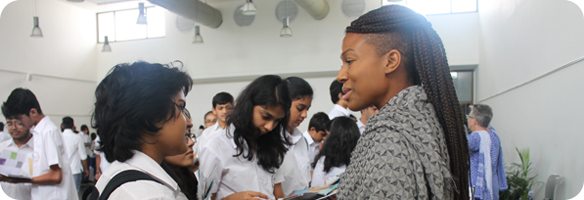
University Counselling
The Aga Khan Academy Hyderabad’s university counselling programme offers students a vast array of resources designed to help them find good matches between themselves and universities or colleges. These resources include a dynamic and well-resourced university counsellor, a wealth of printed, video and online tools, and a series of informational workshops and seminars on topics central to the university discovery process. Each year, we host university fairs at the Academy which are attended by universities from around the world, giving our students exposure to a wealth of options from which to choose.
Our counsellor engages students in individual conferences that are designed to help students reach a greater awareness of who they are. Armed with the well-articulated sense of self, students are prepared to find universities or colleges that are the best fit. Ours is a student-centred approach, and we believe that the likelihood of satisfaction with their choices is enhanced when students are empowered to 'own' the process. Also key to success is good communication among all parties: students, parents and university counsellors. While outcomes are important, it is the process of self-discovery and university-discovery on which our programme focuses.
For more information, please write to our University Counsellor, Pragati Pandey, reachable at pragati.pandey@agakhanacademies.org.
Click here to view the 2023-2024 school profile.
Click here to download a copy of the 2023-2024 University Counselling Handbook.
